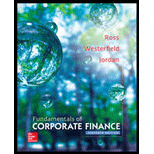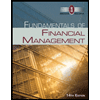
Fundamentals of Corporate Finance
11th Edition
ISBN: 9780077861704
Author: Stephen A. Ross Franco Modigliani Professor of Financial Economics Professor, Randolph W Westerfield Robert R. Dockson Deans Chair in Bus. Admin., Bradford D Jordan Professor
Publisher: McGraw-Hill Education
expand_more
expand_more
format_list_bulleted
Question
Chapter 15, Problem 9CRCT
Summary Introduction
To determine: Whether the assistant professor had a bad luck or should the professor have expected to do worse than the average initial public offering.
Introduction:
The private companies offer their stock for the first time to the public and this offering is termed as the initial public offerings. The private company that desire to become a publicly traded company usually offers the initial public offerings. The sale of the stocks below the true value is the underpricing.
Expert Solution & Answer
Want to see the full answer?
Check out a sample textbook solution
Students have asked these similar questions
Don't use ai tool please .
What is the primary purpose of diversification in a portfolio?
a) To maximize returnsb) To reduce riskc) To increase leveraged) To focus on a single asset class
Don't use chatgpt.
A company’s weighted average cost of capital (WACC) is used to:
A) Determine the average cost of producing goods
B) Evaluate the return on investment projects
C) Estimate the company's growth rate
D) Measure the level of debt in the company
What is the primary purpose of diversification in a portfolio?
a) To maximize returnsb) To reduce riskc) To increase leveraged) To focus on a single asset class
Chapter 15 Solutions
Fundamentals of Corporate Finance
Ch. 15.1 - Prob. 15.1ACQCh. 15.1 - Prob. 15.1BCQCh. 15.2 - What are the basic procedures in selling a new...Ch. 15.2 - What is a registration statement?Ch. 15.3 - Prob. 15.3ACQCh. 15.3 - Why is an initial public offering necessarily a...Ch. 15.4 - Prob. 15.4ACQCh. 15.4 - Prob. 15.4BCQCh. 15.5 - Prob. 15.5ACQCh. 15.5 - Suppose a stockbroker calls you up out of the blue...
Ch. 15.6 - What are some possible reasons why the price of...Ch. 15.6 - Explain why we might expect a firm with a positive...Ch. 15.7 - What are the different costs associated with...Ch. 15.7 - What lessons do we learn from studying issue...Ch. 15.8 - Prob. 15.8ACQCh. 15.8 - What questions must financial managers answer in a...Ch. 15.8 - Prob. 15.8CCQCh. 15.8 - When does a rights offering affect the value of a...Ch. 15.8 - Prob. 15.8ECQCh. 15.9 - What are the different kinds of dilution?Ch. 15.9 - Is dilution important?Ch. 15.10 - What is the difference between private and public...Ch. 15.10 - Prob. 15.10BCQCh. 15.11 - What is shelf registration?Ch. 15.11 - Prob. 15.11BCQCh. 15 - Prob. 15.1CTFCh. 15 - Smythe Enterprises is issuing securities under...Ch. 15 - Prob. 15.4CTFCh. 15 - Prob. 15.7CTFCh. 15 - Debt versus Equity Offering Size [LO2] In the...Ch. 15 - Debt versus Equity Flotation Costs [LO2] Why are...Ch. 15 - Bond Ratings and Flotation Costs [LO2] Why do...Ch. 15 - Underpricing in Debt Offerings [LO2] Why is...Ch. 15 - Prob. 5CRCTCh. 15 - Prob. 6CRCTCh. 15 - Prob. 7CRCTCh. 15 - Prob. 8CRCTCh. 15 - Prob. 9CRCTCh. 15 - Prob. 10CRCTCh. 15 - Prob. 1QPCh. 15 - Prob. 2QPCh. 15 - Rights [LO4] Red Shoe Co. has concluded that...Ch. 15 - Prob. 4QPCh. 15 - Calculating Flotation Costs [LO3] The Valhalla...Ch. 15 - Prob. 6QPCh. 15 - Prob. 7QPCh. 15 - Prob. 8QPCh. 15 - Dilution [LO3] Eaton, Inc., wishes to expand its...Ch. 15 - Prob. 10QPCh. 15 - Dilution [LO3] In the previous problem, what would...Ch. 15 - Prob. 12QPCh. 15 - Value of a Right [LO4] Show that the value of a...Ch. 15 - Prob. 14QPCh. 15 - Prob. 15QPCh. 15 - Prob. 1MCh. 15 - Prob. 2MCh. 15 - Prob. 3MCh. 15 - Prob. 4M
Knowledge Booster
Similar questions
- I need help! A company’s weighted average cost of capital (WACC) is used to: A) Determine the average cost of producing goods B) Evaluate the return on investment projects C) Estimate the company's growth rate D) Measure the level of debt in the companyarrow_forwardNeed help!! What does the term "liquidity" refer to in finance? A) The ability to convert assets into cash quickly without significant loss of value B) The ability to increase company profits C) The level of debt in the company D) The diversity of the investment portfolioarrow_forwardI need answer step by step. A company’s weighted average cost of capital (WACC) is used to: A) Determine the average cost of producing goods B) Evaluate the return on investment projects C) Estimate the company's growth rate D) Measure the level of debt in the companyarrow_forward
- Don't use ai A company’s weighted average cost of capital (WACC) is used to: A) Determine the average cost of producing goods B) Evaluate the return on investment projects C) Estimate the company's growth rate D) Measure the level of debt in the companyarrow_forwardA company’s weighted average cost of capital (WACC) is used to: A) Determine the average cost of producing goods B) Evaluate the return on investment projects C) Estimate the company's growth rate D) Measure the level of debt in the companyarrow_forwardI need help! Which of the following best defines "diversification" in investment? A) Investing in a single type of asset for high returns B) Spreading investments across different assets to reduce risk C) Putting all funds into low-risk bonds D) Focusing on high-risk, high-return investmentsarrow_forward
- Which of the following best defines "diversification" in investment? A) Investing in a single type of asset for high returns B) Spreading investments across different assets to reduce risk C) Putting all funds into low-risk bonds D) Focusing on high-risk, high-return investmentsarrow_forwardWhich of the following best describes the "efficient market hypothesis"? A) Stocks are always priced higher than their actual value. B) It is impossible to outperform the market consistently due to all information being already reflected in stock prices. C) Only insider information can help outperform the market. D) The market reacts slowly to new information.arrow_forwardThe "time value of money" concept states that: A) Money today is worth more than the same amount in the future B) Money tomorrow is worth more than today’s money C) Money and time have no relation in financial decisions D) Time has no impact on financial investmentsarrow_forward
- I need help. If net income is $25,000 and total equity is $125,000, what is the return on equity (ROE)?A. 10%B. 15%C. 20%D. 25%arrow_forwardI need help!!Which of the following is NOT a type of financial market? A) Capital Market B) Money Market C) Labor Market D) Commodity Marketarrow_forwardWhich of the following is NOT a type of financial market? A) Capital Market B) Money Market C) Labor Market D) Commodity Marketarrow_forward
arrow_back_ios
SEE MORE QUESTIONS
arrow_forward_ios
Recommended textbooks for you
 Fundamentals of Financial Management (MindTap Cou...FinanceISBN:9781337395250Author:Eugene F. Brigham, Joel F. HoustonPublisher:Cengage Learning
Fundamentals of Financial Management (MindTap Cou...FinanceISBN:9781337395250Author:Eugene F. Brigham, Joel F. HoustonPublisher:Cengage Learning Fundamentals of Financial Management (MindTap Cou...FinanceISBN:9781285867977Author:Eugene F. Brigham, Joel F. HoustonPublisher:Cengage Learning
Fundamentals of Financial Management (MindTap Cou...FinanceISBN:9781285867977Author:Eugene F. Brigham, Joel F. HoustonPublisher:Cengage Learning Excel Applications for Accounting PrinciplesAccountingISBN:9781111581565Author:Gaylord N. SmithPublisher:Cengage Learning
Excel Applications for Accounting PrinciplesAccountingISBN:9781111581565Author:Gaylord N. SmithPublisher:Cengage Learning

Fundamentals of Financial Management (MindTap Cou...
Finance
ISBN:9781337395250
Author:Eugene F. Brigham, Joel F. Houston
Publisher:Cengage Learning

Fundamentals of Financial Management (MindTap Cou...
Finance
ISBN:9781285867977
Author:Eugene F. Brigham, Joel F. Houston
Publisher:Cengage Learning


Excel Applications for Accounting Principles
Accounting
ISBN:9781111581565
Author:Gaylord N. Smith
Publisher:Cengage Learning